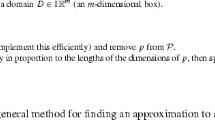Abstract
The population Monte Carlo algorithm is an iterative importance sampling scheme for solving static problems. We examine the population Monte Carlo algorithm in a simplified setting, a single step of the general algorithm, and study a fundamental problem that occurs in applying importance sampling to high-dimensional problem. The precision of the computed estimate from the simplified setting is measured by the asymptotic variance of estimate under conditions on the importance function. We demonstrate the exponential growth of the asymptotic variance with the dimension and show that the optimal covariance matrix for the importance function can be estimated in special cases.
Similar content being viewed by others
References
Cappé O, Guillin A, Marin J-M, Robert C P (2004) Population Monte Carlo. J Comput Graph Stat 13(4):907–929
Chopin N (2004) Central limit theorem for sequential Monte Carlo methods and its application to Bayesian inference. Ann Stat 32(6):2385–2411
Douc R, Guillin A, Marin J-M, Robert CP (2007a) Convergence of adaptive sampling schemes. Ann Stat 35(1)
Douc R, Guillin A, Marin J-M, Robert CP (2007b) Minimum variance importance sampling via Population Monte Carlo. ESAIM, Probab Stat 11:427–447
Gelman A, Carlin J B, Ster HS, Rubin DB (1995) Bayesian data analysis. Chapman & Hall, London
Goldon N, Salmon D, Smith A (1993) Novel approach to nonlinear/non-Gaussian Bayesian state estimation. IEEE Proc-F 140(2):107–113
Horn R, Johnson C (1985) Matrix analysis. Cambridge University Press, Cambridge
Li B, Bengtsson T, Bickel P (2005) Curse-of-dimensionality revisited: collapse of importance sampling in very large scale systems. Technical report 696, Department of Statistics, UC-Berkeley
Liu J (2001) Monte Carlo strategies in scientific computing. Springer series in statistics. Spring, New York
Liu J, Chen R (1998) Sequential Monte Carlo methods for dynamic systems. J Am Stat Assoc 93(443):1032–1044
Neal P, Roberts G (2008) Optimal scaling for random walk Metropolis on spherically constrained target densities. Methodol Comput Appl Probab 10(2):277–297
Pitt M, Shepard N (1999) Filtering via simulation: auxilliary particle filters. J Am Stat Assoc 94(446):590–599
Roberts GO, Rosenthal J (2006) Examples of adaptive MCMC. Technical report, Lancaster University
Roberts GO, Rosenthal JS (2001) Optimal scaling for various Metropolis-Hastings algorithms. Stat Sci 16(4):351–367
Roberts GO, Gelman WR, Gilks A (1997) Weak convergence and optimal scaling of random walk Metropolis algorithms. Ann Appl Probab 7(1):110–120
Rubinstein R (1981) Simulation and the Monte Carlo Method. Wiley, New York
Author information
Authors and Affiliations
Corresponding author
Rights and permissions
About this article
Cite this article
Lee, J.E., McVinish, R. & Mengersen, K. Population Monte Carlo Algorithm in High Dimensions. Methodol Comput Appl Probab 13, 369–389 (2011). https://doi.org/10.1007/s11009-009-9154-2
Received:
Revised:
Accepted:
Published:
Issue Date:
DOI: https://doi.org/10.1007/s11009-009-9154-2
Keywords
- Asymptotic variance of estimate
- Central limit theorem
- Importance sampling
- Markov chain Monte Carlo
- Population Monte Carlo




